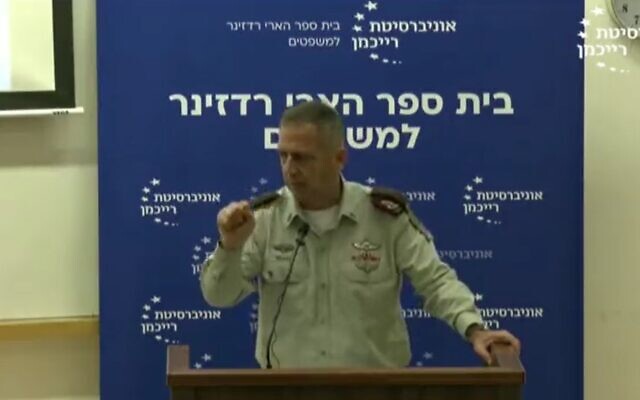Aviv Kohavi hails ‘advanced capabilities’ that enabled pilots to evade missile defenses and hit specific truck in 25-vehicle procession in early November

IDF Chief of Staff Aviv Kohavi confirmed Wednesday that an airstrike in early November on a convoy allegedly carrying Iranian arms near the Syria-Iraq border was carried out by the Israeli Air Force.
Kohavi said Israeli intelligence uncovered which truck within the 25-vehicle convoy was carrying weapons from Iran to Lebanon, and that “advanced abilities” allowed the pilots to carry out a precision strike.
“We couldn’t have not been aware of the Syrian convoy a few weeks ago,” Kohavi told a conference at the Reichman University in Herzliya.
“We couldn’t have not known that it was heading from Iraq to Syria, we couldn’t have not known what’s in it and we couldn’t have not known that out of the 25 trucks, truck number eight was the one carrying weapons,” he said.
“We needed to send pilots to the right place and they had to evade surface-to-air missiles fired at them. They needed to attack, they needed to hit their targets and come back safely and not kill people who shouldn’t be killed. These are very advanced capabilities,” said Kohavi.
The strike reportedly left 10 people dead, including an unknown number of Iranians.
Syrian media shares this video claiming to show the convoy of trucks carrying fuel from Iran to Lebanon, an hour before it was targeted over night on the Iraq-Syria border. Nahr Media says the trucks were accompanied by Lebanese Hezbollah forces. pic.twitter.com/glXLjWoJ0r
— Ariel Oseran (@ariel_oseran) November 9, 2022
At the time of the November incident, the Israeli army refused to comment, in line with its general policy to not confirm involvement in specific strikes in Syria.
It wasn’t clear why Kohavi, who will end his term as military chief of staff next month, chose to acknowledge the IDF’s responsibility for the strike.
Israel has allegedly carried out hundreds of strikes on targets inside government-controlled parts of Syria in recent years, but rarely acknowledges or discusses such operations. It has acknowledged, however, that it targets arms shipments and posts of Iran-allied groups, such as Lebanon’s terrorist Hezbollah.
At the time, Hezbollah said it had nothing to do with the convoy that was attacked.
The Britain-based Syrian Observatory for Human Rights, an opposition war monitor of unclear funding, said the strike hit tanker trucks carrying fuel and other trucks carrying weapons for the militias in Syria’s eastern province of Deir el-Zour.
Most alleged Israeli strikes have been focused on areas of Syria closer to Damascus or the country’s center, though it has been accused of carrying out attacks outside that area as well, including in Deir el-Zour.
Iran is an ally of Syrian President Bashar Assad and has sent thousands of Iran-backed fighters to help Syrian troops during the country’s 11-year civil war. Both Tehran and the Assad government are allied with Hezbollah, which has fought alongside Assad’s forces in the war.
Israeli strikes have continued in Syrian airspace, which is largely controlled by Russia, even as ties with Moscow have frayed in recent months. Israel has found itself at odds with Russia as it has increasingly supported Ukraine while seeking to maintain freedom of movement in Syria’s skies.
As reported by The Times of Israel
